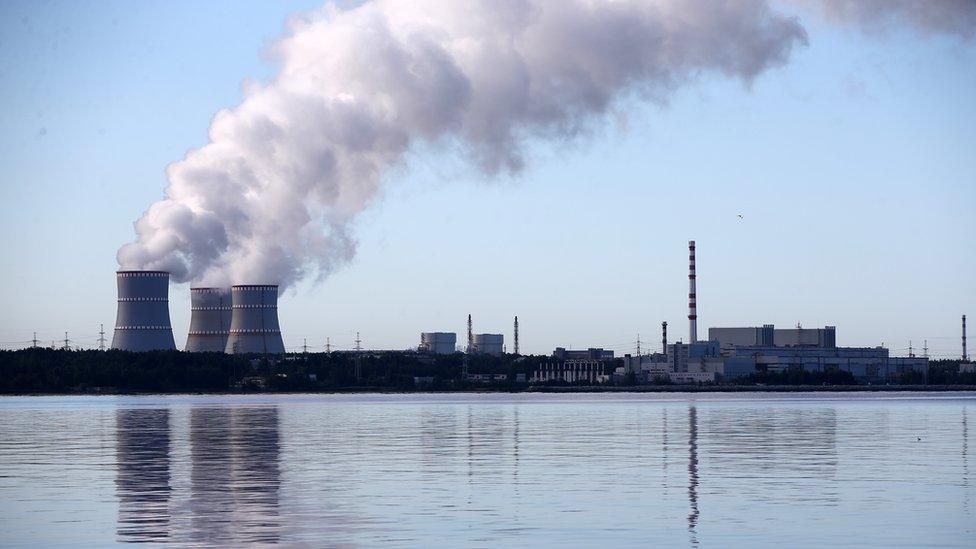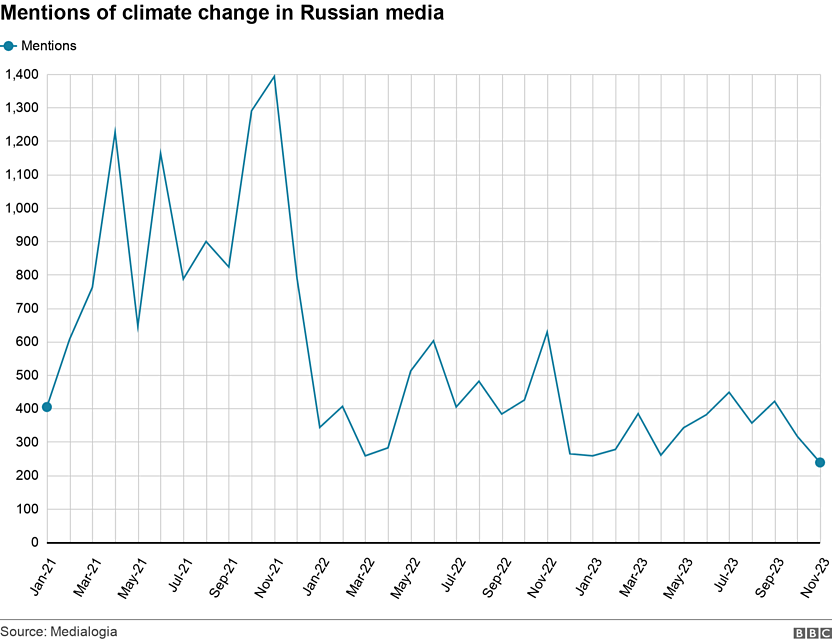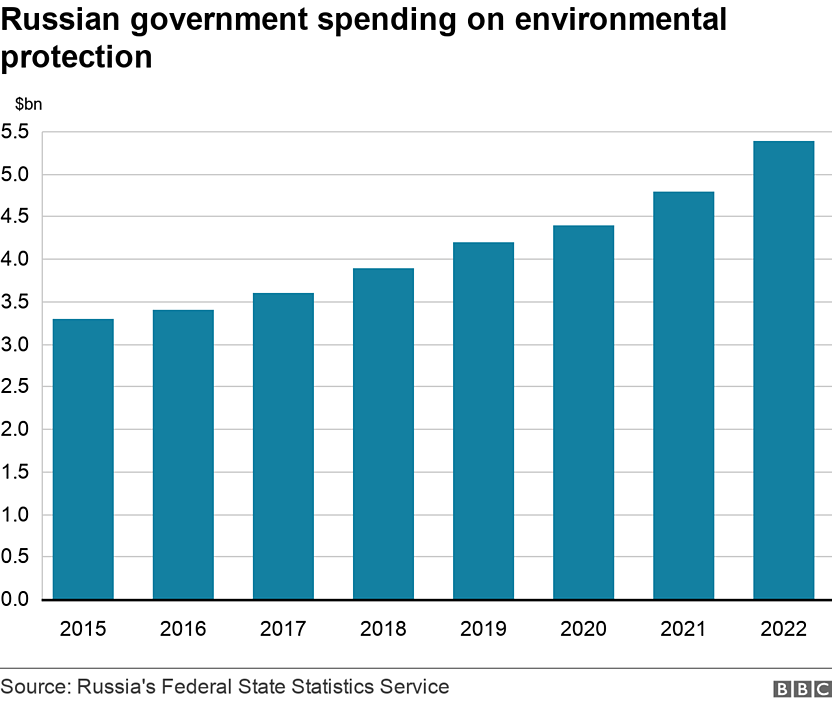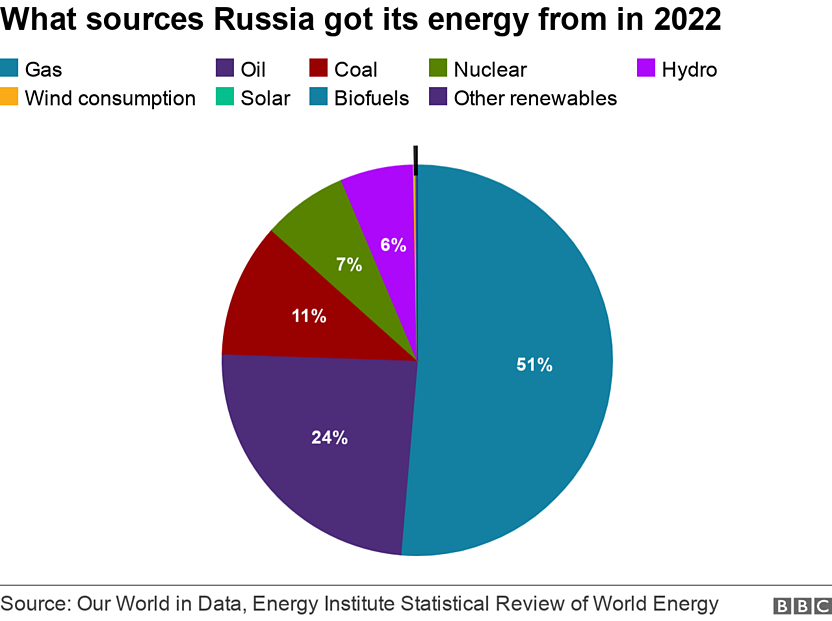How the war changed Russia’s climate agenda
- Published

Where does Russia stand on climate change?
Ahead of the UN's COP28 climate summit in Dubai, Russia spoke against the "phasing out" of fossil fuels, external, while its recently updated climate doctrine, external makes no mention of fossil fuels and their impact on climate change.
While there is a broad scientific consensus that gas emissions from fossil fuels need to be drastically reduced, Russia marginally upped its oil and coal production in 2022.
In further evidence of Russia playing spoiler to spite the West, the Kremlin is blocking EU countries from hosting the COP29 summit scheduled for 2024, according to Reuters, external.

Mentions of climate change in Russian media
Moscow said it was sticking to the commitments to become carbon neutral by 2060 and limit greenhouse gas emissions to 70% of 1990 levels by 2030, yet climate change experts see those targets as modest.
Russia's levels of emissions already stand at around 30% below 1990 levels, excluding forest sinks.
The Climate Action Tracker, external, a research project that tracks government climate action and the globally agreed Paris Agreement commitments, rated Russia's climate targets as "highly insufficient" to meet the 1.5°C criteria.

Russia's CO2 profile
Some of Russia's environmental initiatives have been further watered down amid the country's focus on the war effort against Ukraine and the urgent need to replace Western goods on the domestic market.
In May 2022, the government allowed domestic car makers, external to produce vehicles with Euro 2 environmental standard engines, rolling back previous regulations that required all cars to meet the previously adopted Euro 5 standard.
Alexander Shokhin, Russia's top business lobbyist, complained about the rising costs, external of meeting climate targets and called for the country's climate commitments to be downgraded even further amid Western sanctions.
What projects are at risk?
The dependence on imported equipment and technologies needed to reduce carbon emissions is 55% in the oil sector, 45% in the coal sector and 31% in the power sector, according to the calculations published by the Russian Academy of Sciences (RAS) in November.
As a result, the future of some Russian projects that depended on cooperation with the West is now in doubt.
For example, the withdrawal of the Finnish state-owned energy company Fortum from the Russian market has put a damper on plans to build wind farms in the country.
Mikhail Korostikov, who worked on climate issues for Russia's state development corporation VEB.RF, and is now a senior analyst at the UK-based Climate Bonds Initiative, said the environment has been the obvious casualty of the breakdown in economic relations between Russia and the West.
Russia has few pragmatic reasons to be at the forefront of climate initiatives, he explained: "The majority of the country's population lives in areas not severely affected by global warming, while its economy depends on the export of fossil fuels."
But the European Union's carbon border tax initiative, which before the Ukraine war was expected to hit Russia the hardest after its scheduled introduction in 2026, forced Moscow to take the issue of climate change seriously "for the first time in its history", as inaction would threaten the competitiveness of Russian companies, Korostikov said.
The EU initiative would mean manufacturers outside the bloc would face extra levies in proportion to the carbon dioxide they emit, with Russian iron, steel, aluminium and fertiliser suppliers being the main targets.
Amid this pressure to decarbonise, Russia took efforts to develop platforms for reducing its carbon footprint, similar to those that exist in Western countries, Korostikov recalled.
One important step in this direction was the development by VEB.RF of the criteria to determine whether certain products or firms qualify as environmentally friendly, making it easier for them to attract investors and perks from the state.
The Sakhalin experiment
Russia has also tried to create a carbon trading market, through which companies could buy permits to emit a certain amount of greenhouse gases.
The Sakhalin pilot project, which was approved in 2021 and launched in 2023, was designed to test such a market and attempt to achieve carbon neutrality on the island by 2025.
However, the lack of government enthusiasm, due to oil and gas industry lobbying, has meant that most climate finance initiatives are "either in their infancy or have been frozen after the war due to a lack of funding", Korostikov noted.

For example, plans to extend the Sakhalin experiment to other regions have been shelved, according to the Ministry of Economic Development, external.
"The EU's pressure on Russia is still a factor, but its importance has declined in proportion to the decline in the importance of the European market for Russian companies," Korostikov said.
The value of Russian exports to the EU falling by 81%, external between February 2022 and September 2023.
Some business leaders, such as Yulia Shabala, deputy director of the steel company Metaloinvest, said that Russia should ensure, external that its CO2 emissions verification system was compatible primarily with Asian countries, particularly China, Korea and Vietnam, rather than the EU.

Russia energy sources
What next for Russia's climate agenda?
Still, there is a degree of positive inertia when it comes to Russia's climate agenda, so the decline in ambition of climate initiatives does not spell a complete disaster.
Despite calls to leave the Paris Agreement, external, which aims to limit global warming to 1.5 degrees Celsius, Russia's government insisted it does not have plans to do so, external.
While Russia is ahead of developing economies like China and India in terms of CO2 emissions per capita, it requires less CO2 for the country to produce a unit of electricity.
Many private firms are working on decarbonising their own capacity and portfolios because of "the enthusiasm of managers and their own resources", said Korostikov.
Finally, there is another factor that might allow Russia to limit carbon emissions, although this was not something the Kremlin planned for: economic slowdown.
Alexander Shirov, director of economic forecasting at the RAS, said that Russia's goal of carbon neutrality by 2060, external was alive, not least because "economic dynamics will not be as high as envisaged".